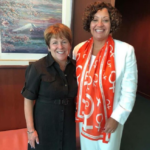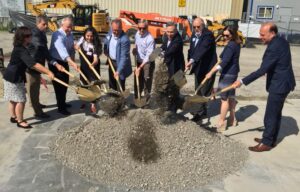Community visits validate strength in partnerships
Summertime is perfect for getting out on the road to check in with the many partners who help Commerce fulfill our mission of strengthening communities. I enjoy nothing more than learning directly from individuals and organizations across the state how we are doing and how we can do better at improving the lives of the people we serve.
There are too many highlights to talk about in this brief update – and I still have several stops on my “road trip” calendar before fall – but I’ll share a few here to give a sense of the great things happening in every corner of Washington.
I had the privilege of speaking and meeting with members and supporters of the Washington State Women’s Commission, including commissioner Regina Malveaux, executive director of the YWCA Spokane, at WSWC’s meeting and outreach event co-sponsored by Gonzaga University. For economic, social, and historical reasons, a disproportionate number of women find themselves disadvantaged or isolated from the benefits of equal opportunity. The commission was established in 2018 to provide a focal point in state government for addressing women’s issues, knowing that improving the well-being of women will have a positive impact on larger societal issues. I encourage you to learn more and engage with the WSWC’s agenda and work.
Partnering to end homelessness
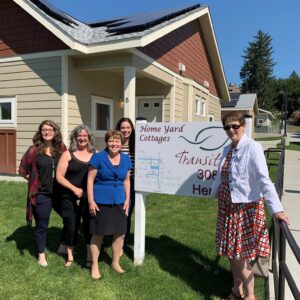
At Home Yard Cottages in Spokane, permanent supportive housing project aided by the state Housing Trust Fund
I visited Home Yard Cottages in Spokane, a permanent supportive housing project serving low-income, disabled and formerly homeless people including women and children. Our Housing Trust Fund helped fund the 24 homes – 15 of which are net-zero, complete with solar panels. They are built on two acres once used as the Spokane Children’s Home orphanage and known as “the home yard.” Next door is a Transitional Living Center, providing case management and services including job training at the nearby New Leaf Bakery Café and catering business (New Leaf catered the Washington State Women’s Commission event in Spokane!) Home Yard is one example among hundreds throughout the state of how Commerce is working with local, federal, private nonprofits and other partners to help end homelessness in Washington.
Another is seen here at the groundbreaking for Hobson Place, 85 units of affordable housing in King County designated for people with special needs and mental illness. Commerce awarded a $300,000 grant to help with construction.
Read about other great projects and housing partners hitting milestones this summer, including Compass Housing in Everett, and Mercy Magnuson Place in Seattle.
Partnering to strengthen regional economies
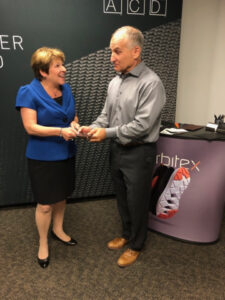
Carbitex CEO Ron Bonninger explains their high-performance carbon fiber material during discussion of Tri-Cities region’s strengths in materials science and advanced manufacturing.
Technology innovation is driving impressive growth across multiple industry sectors in Washington. While you might think of the Puget Sound region when you hear “tech,” the world is much bigger than the household names orbiting Greater Seattle. Our recent trip east of the Cascades reaffirmed that Tri-Cities is a hotbed of opportunities springing from science and engineering leadership. Carbitex, for example, is augmenting the strength, durability and light weight advantages of carbon fiber with flexible properties that are transforming high performance footwear, fashion and travel gear. CEO Ron Bonninger agrees that exploring apprenticeships and higher education partnerships to create a robust pool of local tech workers with skills applicable to advanced materials manufacturing and materials science is one way we can support a burgeoning regional tech economy here.
Pacific Northwest National Laboratory (PNNL) is a leader in clean energy technology research and development. Dr. Jud Virden, Associate Laboratory Director for the Energy and Environmental Directorate, updated us on advanced battery technologies being developed at PNNL, thanks in part to a grant from Washington’s Clean Energy Fund. Batteries and energy storage are essential to development of a cleaner, more resilient and reliable electric grid that will enable a low-carbon future.
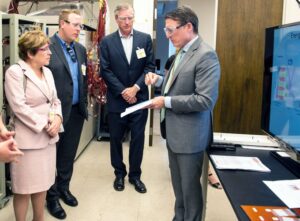
Batteries and energy storage technology being developed at PNNL, led by Dr. Jud Virden, are essential to a cleaner, more resilient and reliable electric grid that will enable the future low-carbon economy.
In addition to clean energy technology research, PNNL scientists this week are in the spotlight for their pioneering work on low energy manufacturing of new lightweight metals – another Clean Energy Fund project! Shear Assisted Processing and Extrusion (ShAPE™) is a new materials and manufacturing method offering extraordinary properties and reduced energy consumption. At industrial scale, ShAPE™ has the potential to make cars and planes more fuel efficient and super strong.
It’s always mind-blowing to see the advances in technology that Washington engineers and scientists continue to bring to the world.
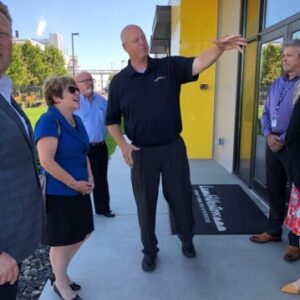
Lamb Weston’s Mark Schuster, global supply chain VP, points to LW Innovation Center before we tour their massive, state-of-the-art frozen potato operations – the largest and best in the world.
Speaking of mind-blowing, our visit to Lamb Weston HQ in Richland showed the impact of technology in agriculture and food processing. After seeing their super secret Innovation Center and getting a glimpse of the company’s new construction across the street, Mark Schuster, global supply chain vice president, gave us a tour of their state-of-the-art frozen potato operations – the largest and best in the world. About 5 million pounds of Washington-grown potatoes are processed here every day for global markets. Lamb Weston’s expansion here was encouraged with support from the economic development strategic reserve fund.
Among the challenges for major exporters that we discussed with Shuster and his team are volatile federal trade policy and tariffs, and difficulty with transportation congestion around our sea ports.
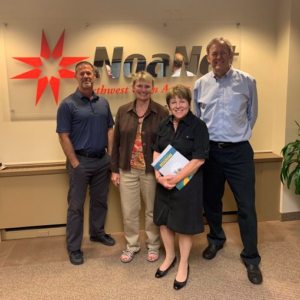
NoaNet is expanding broadband access and quality, a key to building strong regional economies with equal opportunities in rural communities.
Key to building strong regional economies and developing opportunities in rural communities is digital equity – reliable, high-speed internet access for all.
Cindy Zehnder, vice president, Gordon Thomas Honeywell, arranged a tour of NoaNet’s Network Operating Center in Spokane. We got a detailed update on significant broadband infrastructure expansion enabled by passage of the Rural Broadband bill.
Learn more at their website: https://noanet.net/.

